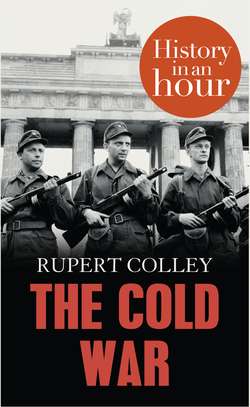Читать книгу The Cold War: History in an Hour - Rupert Colley - Страница 8
ОглавлениеThree Speeches: ‘An iron curtain has descended’
In eastern Europe Stalin spread his influence to set up communist governments, where hardline communists loyal to Stalin used intimidation, violence and threats to disrupt the democratic process and seize control. In doing so the east European satellites provided the Soviet Union with a buffer against western Europe. The free elections in eastern Europe that Stalin had promised during the Big Three talks never materialized, except in East Berlin where, in October 1946, the communists polled only 20 per cent of the vote. But Walter Ulbricht, Stalin’s man in East Germany, with the Soviet juggernaut behind him, bullied his way into power. Capitalism, according to a speech Stalin made in February 1946, made war inevitable; only communism could bring genuine world peace. And as the capitalist nations squabbled among themselves, he continued, the people of western Europe would choose communism.
Churchill, now no longer in office, gave a speech in Missouri on 5 March 1946, in which he coined the phrase the ‘Iron Curtain’, saying: ‘From Stettin in the Baltic to Trieste in the Adriatic, an iron curtain has descended across the continent.’ Britain, struggling economically, began the process of dismantling its empire – granting India independence in 1947, and removing military assistance and economic aid to Greece. The Greeks were in the midst of a bitter civil war between nationalists and communists and the US feared that without British aid, Greece would fall to communism and other struggling European nations would follow.
‘The seeds of totalitarian regimes,’ said US president, Harry S. Truman, on 12 March 1947, ‘are nurtured by misery and want.’ In other words, communism appealed to those suffering from hardship; remove the hardship, you remove the appeal of communism. Known as the Truman Doctrine, the president said that communism had to be contained, and that the USA could not, as it did after the First World War, turn its back on Europe – isolationism was no longer an option. Japan’s attack on Pearl Harbor in December 1941, which brought the US into the war, was proof that physical distance was no longer a guarantee of safety. In the post-war era a stable Europe was necessary for the future of the ‘free world’. Out of fear of communism, the US decided to send aid to Greece.
